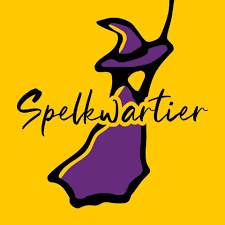It is almost Maundy Thursday, the day before Good Friday. During Good Friday, Christians commemorate the crucifixion and death of Jesus Christ. On Maundy Thursday, Christians commemorate two stories: the anointing of Jesus, but also the Last Supper. The Last Supper has had a significant influence on art, culture and media. Consider, for example, the famous painting by Leonardo da Vinci. In Ierusalem Anno Domini, a board game by Devir, the same Last Supper takes center stage along with other events leading up to the crucifixion and resurrection of Jesus.
Discussion
Let me begin by stating that I am not religious. Nor am I a historian, anthropologist or religious scholar, but I am particularly interested in culture, history and stories, faith and religion, as well as legends, myths and sagas. I enjoy reading about religions of all kinds, and in the Western world you are naturally exposed to stories from the Old and certainly the New Testament, with the narrative highlight being the Passion of Jesus: the stories leading up to Easter and the resurrection of Jesus during Easter.
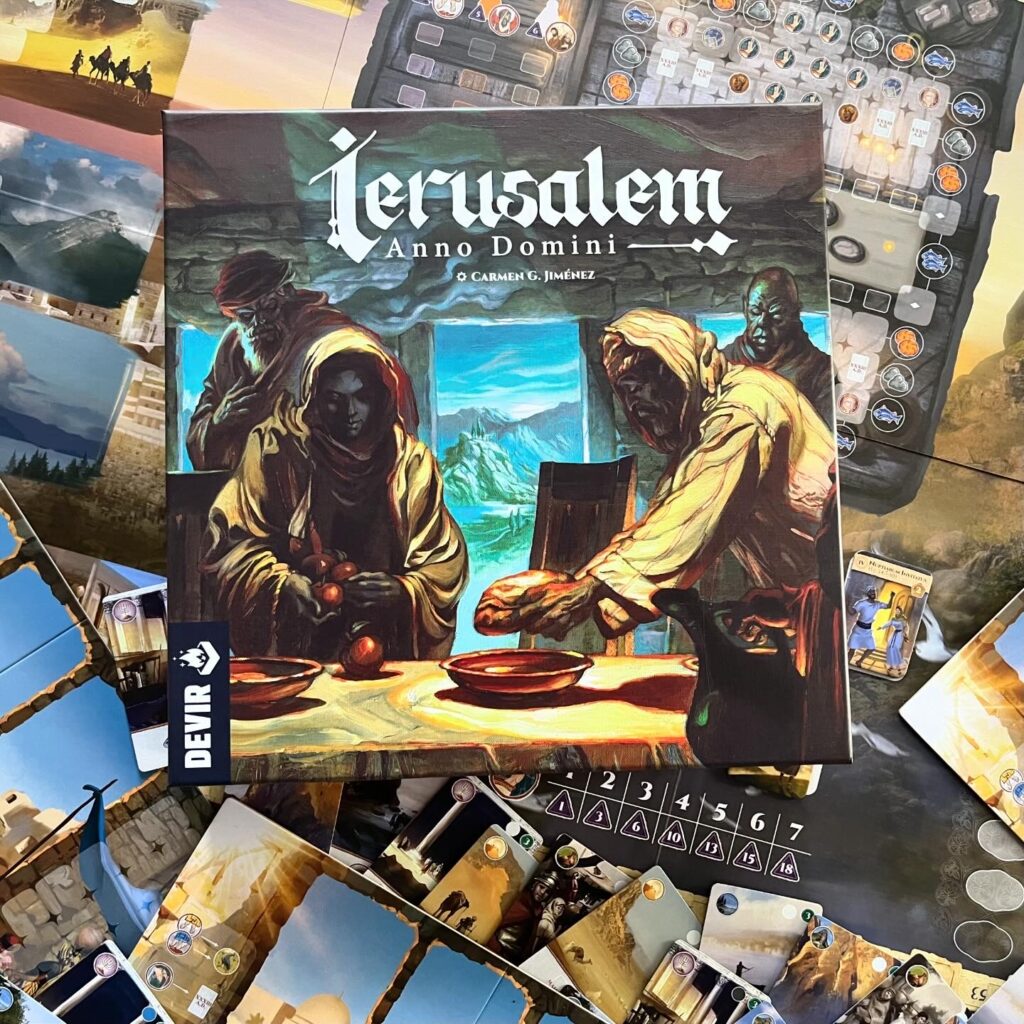
Modern religion and faith in a general sense is often a touchy subject. For some people, faith is a central part of their lives and/or identity. Others are wary of anything to do with religion. Any form of entertainment in which (modern) religions are the focus or theme has the risk of being controversial or perceived as offensive, and that works both ways. Therefore, for several reasons, there will be those who refuse to play a game with such a theme. On BGG, I read several discussions on the topic and theme of this game where proponents and opponents expressed themselves on both ends of the spectrum. Some liked the idea of expressing their religion in game form, others called it blasphemous and yet others want nothing to do with the theme at all and some just saw it as a game.
What do I think? I am fairly neutral on the use of the theme. The telling and interpretation story itself is an important part of the culture and history of many places in this world. I wasn’t expecting a board game with such a theme anytime soon, which is why I found it interesting and attracted me almost immediately. By the way, this is not the first time Devir managed to win me over to one of their more complex Euro games thanks to the theme. Indeed, in 2022 they released the game Lacrimosa about the life of Mozart and his last composition. From me, then, plus points for the use of the theme. I only encourage it when more stuff is published with a unique theme with a historical slant.
Background
Ierusalem Anno Domini is set in 33 AD (or 30 depending on which timeline you adhere to…). Jesus of Nazareth comes to Jerusalem to celebrate Passover with his apostles and followers. Passover one of the most important celebrations in Judaism, commemorating the end of Jewish slavery in Egypt. It is the beginning of the Passion story that is the subject of several gospels and inspired many pieces of classical music (and so the circle with the other Devir title mentioned is sort of complete after all).
The Passion or for many really just the Easter story is a collection of various events and stories that are said to have taken place before the death and resurrection of Jesus according to the various gospels. Jesus arrives in Jerusalem on Palm Sunday, visits and cleanses a temple of immorality, gives his last speech on the Mount of Olives and on what we now know as Maundy Thursday he is anointed and eats his last supper in the presence of his apostles, hosts and followers. Jesus foretells his death and prior to his death his betrayal by Judas Iscariot and that another of his apostles, Peter, would deny knowing Jesus. After his betrayal, Jesus is arrested and tried by the Sanhedrin and the Roman governor Pontius Pilate. Pilate, according to the Gospels, gave the people the opportunity to grant a criminal amnesty during Passover. In the vote between Jesus and the murderer Barabbas, the people choose to release Barabbas and Jesus is crucified, killed and on the third day after his unfortunate yet prophesied end, he is said to have risen from the dead.
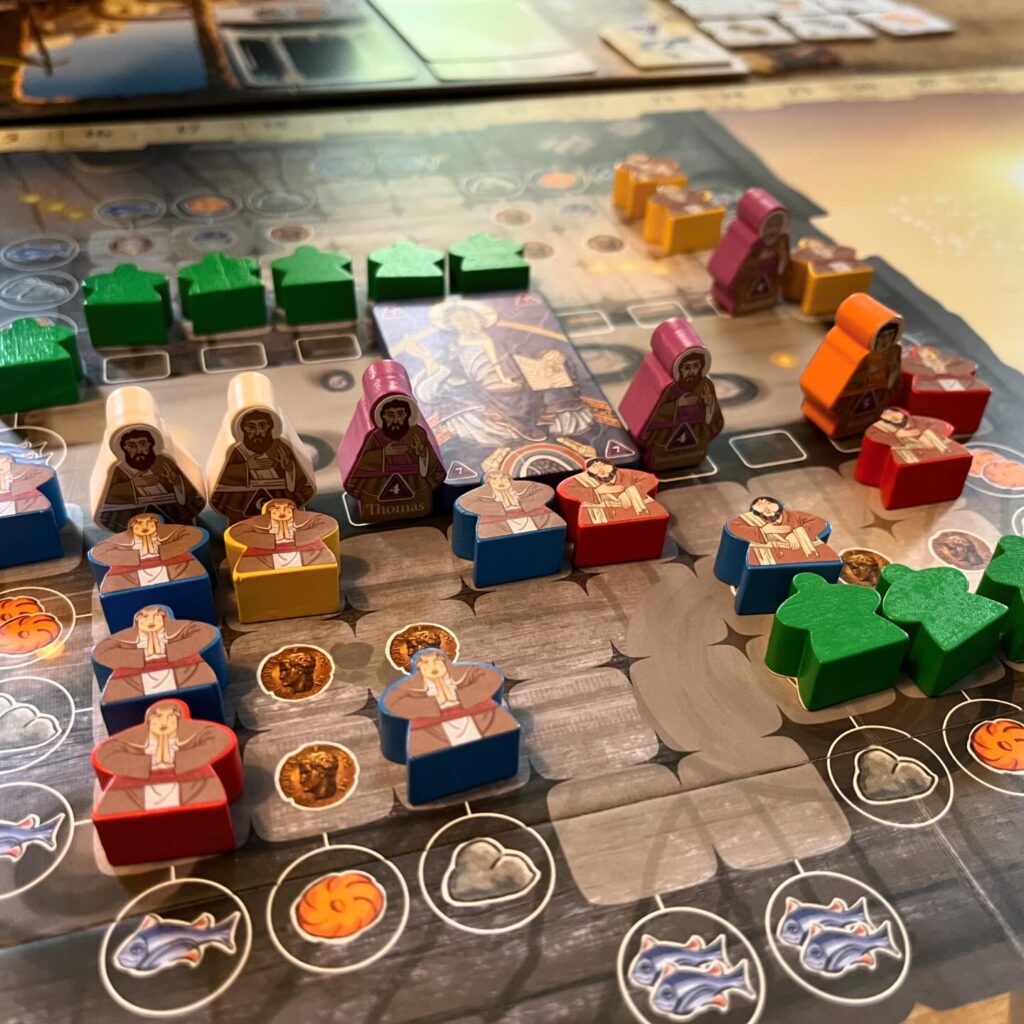
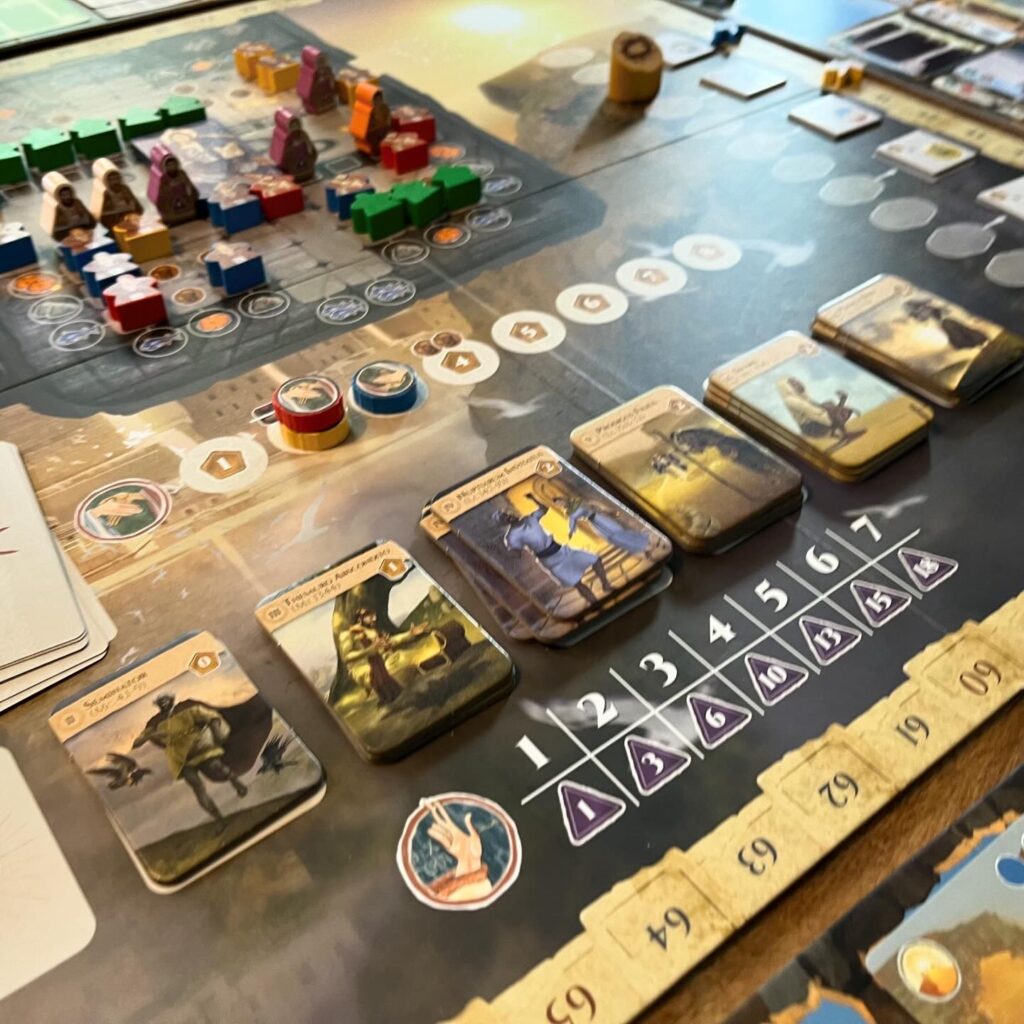
Several elements of the Passion recur in the gameplay. Players try to place followers from their group near Jesus and his apostles during the Last Supper during Ierusalem Anno Domini to collect the most points. Followers come to the supper from multiple locations with gifts such as bread and fish, but also those who have nothing to give (e.g. stones) are welcome. The end of the Last Supper is imminent and then, as we know by now, Jesus is arrested and tried. The latter is represented by the Sanhedrin track on the game board that is moved forward by players over the course of the game. Players also start trading in the bustling Jerusalem market to possibly send more followers on their way and also listen to the parables Jesus tells during his supplication to collect points that way as well. So the fact that players are trying to be closer to Jesus can be taken quite abstractly but also literally in this game.
Setup
Players set up the board and depending on whether there are three or four players, there are some additional steps for game play. AD you can also play on your own or with two people, but I will not cover these game variants further in this review.
Each player gets a player board and parts in his/her chosen color. Players each receive a number of minions (meeples), depending on the order of play some money and victory points, a set of favors, some goods and a deck of cards to form their starting deck. On the central game board the similarity tiles are placed, minions at the indicated spots, Mahane (market) cards at the market, 33 A.D. cards on the relevant pile next to the favor track and goods at the indicated spots. The center of the central game board depicts the Last Supper. Jesus is placed in the middle and next to the meal are the various apostles who only later take their places at the meal.
Gameplay
During the game players try to send their followers to take their places at the Last Supper. Depending on the location at the meal, they receive points. This is because the distance to the apostles and Jesus is assessed and depending on the position, players receive the points belonging to the apostle or Jesus at the end of the game.
During a turn, a player plays a card on his player board, visits an apostle if possible, buys a card from the market if desired and makes sure he has five cards in hand.
Playing a card allows you to activate locations and take specific actions. Importantly, there are three spots on a player’s board to play cards, and you can play cards on top of each other. The order of cards is essential to apostles. Buying or obtaining cards allows you to deploy stronger cards with more other types of actions.
Each card shows a location and first you perform the action of that location. You can visit the market to trade goods or buy a card at a reduced rate. In the desert, mountain or lake you can receive resources depending on the amount of your minions in that location. By visiting the temple you can send minions to the desert, mountain or lake by depositing an amount of money depending on the location.
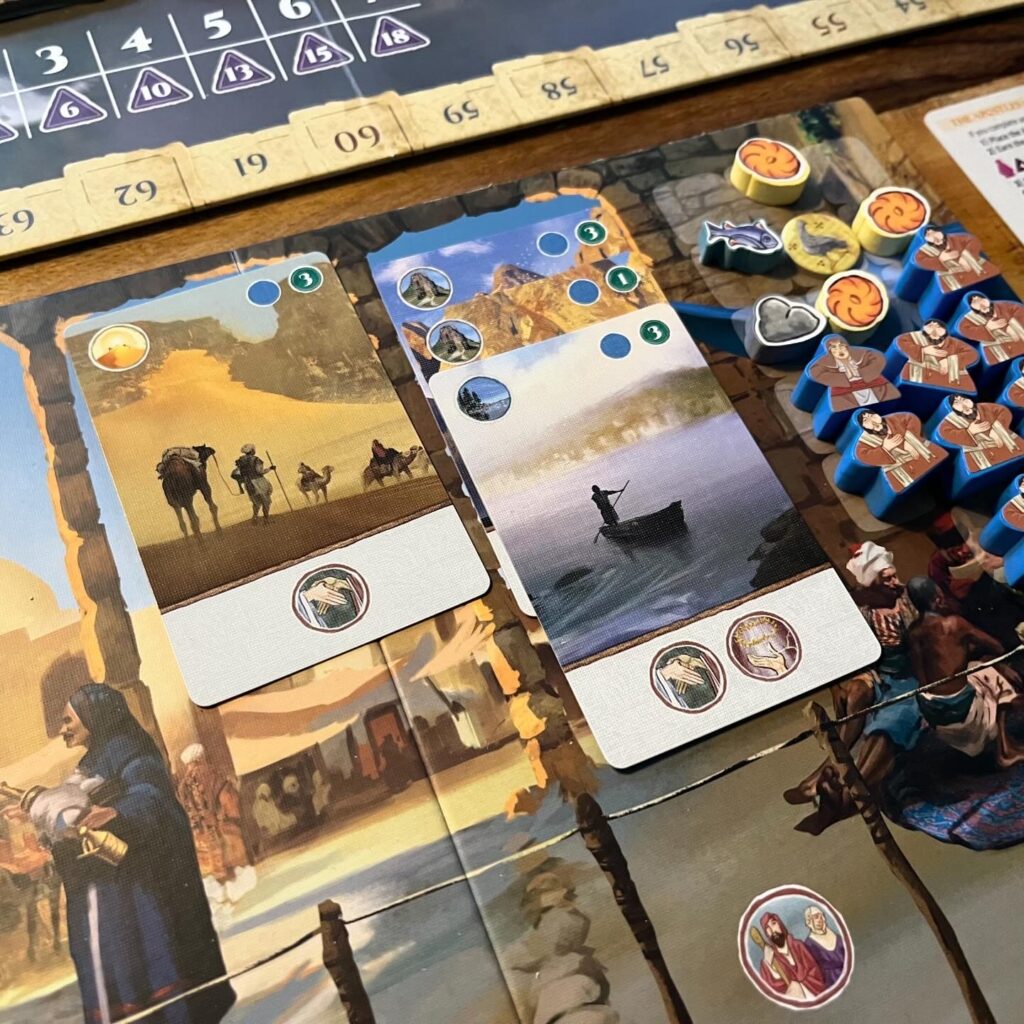
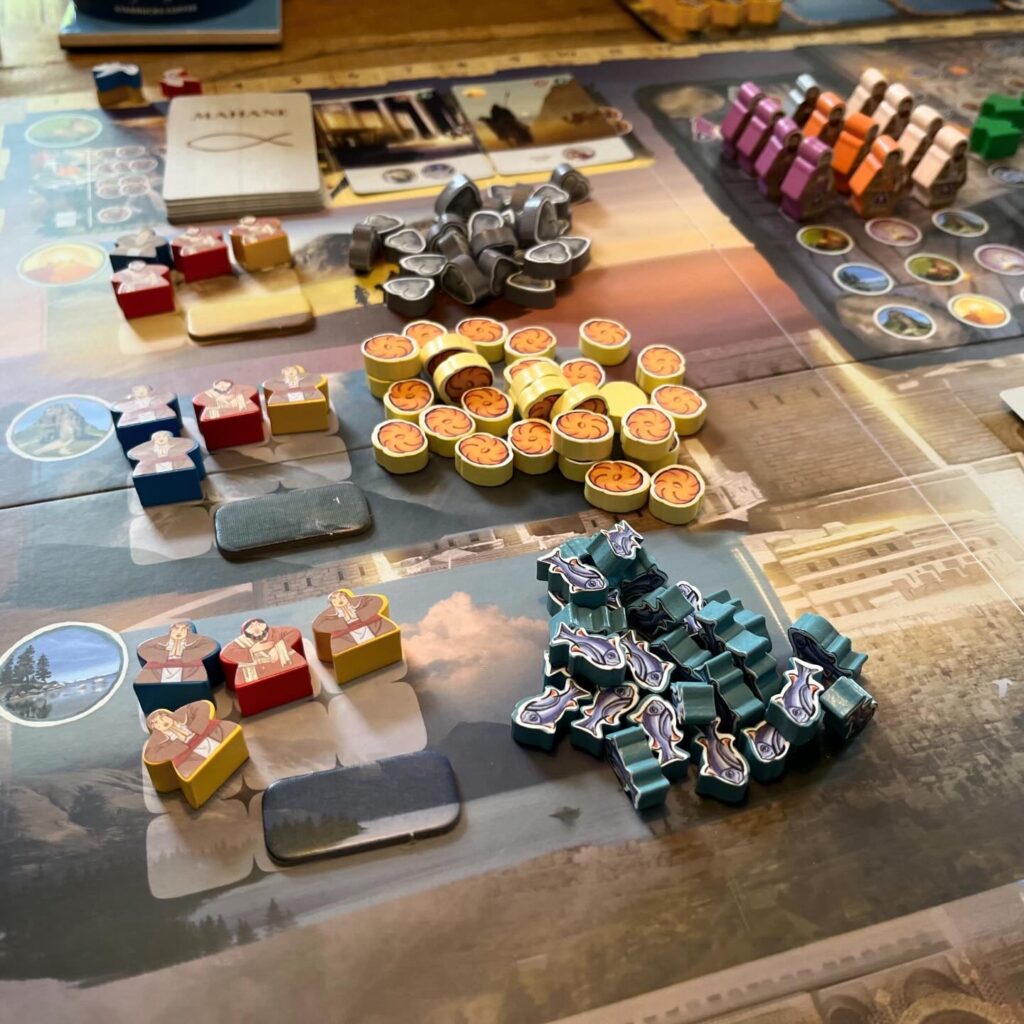
In addition to a location, the cards also depict one or more actions. Players can collect similarity tiles for points, send minions to locations to the Last Supper by paying resources, send minions to locations, have minions switch positions at the meal, receive money or resources, change the order of cards on your player board or move Sanhedrin pawn along the track.
If players have cards in the correct order on their board, they can visit an apostle and then have him take a seat at the Last Supper. Players receive the points depicted on their cards for this purpose plus the bonus action associated with the apostle. In keeping with the theme, Judas earns money, but also minus points. During the game, players can give each other favors with a specific action. This yields chits with locations that players can use to visit apostles. Giving favors also scores points and provides extra action and dynamics in the game play.
Verdict
Ierusalem Anno Domini contains a special theme and great production quality and design that clearly support the theme. The gameplay itself is complex, strategic and dynamic, but is not necessarily tied to the theme. Participating in the Last Supper may feel somewhat abstract as a result, but you could say the same about the theme of many other games. The theme is bold and, as far as I am concerned, certainly adds something to the gameplay.
The game mechanics where cards are used for actions to be taken, as well as the order to visit apostles, feels innovative and provides a sometimes mind-bending strategic puzzle in addition to interesting dilemmas about choice of stakes and timing cards.



